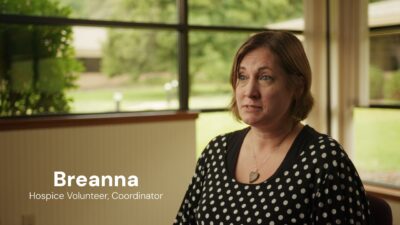Have questions? We can help.
Read common questions we receive and answers from our experts.
Hospice Foundation of America provides confidential guidance to patients, families, and healthcare and social service professionals regarding care at the end of life and bereavement. HFA is not a direct service healthcare provider and does not monitor or regulate hospice providers. Information and education provided through this service does not establish a patient-client relationship.
How hospice helps
When serious illness strikes, most patients and their families initially hope to stop or alter its course by exploring aggressive or invasive treatments. At the end of life, most people hope for quality of life, comfort, peace, and to be near loved ones and familiar possessions. Hospice helps to achieve those goals.
With hospice, your mother’s quality of life will be the top priority. A physician and a registered nurse will oversee management of pain and other symptoms, while a team of professionals provides support with daily functions and non-medical care, as well as psychosocial and spiritual needs.
Hospice does not speed up or delay the dying process. The focus of hospice care is solely to relieve symptoms such as pain, anxiety, and breathlessness at the end of life, allowing natural death to occur in peace and with dignity. The medications used at end of life are for symptom relief only and are never used to hasten death.
Yes, he can. Hospice encourages the patient’s family doctor or specialist to remain engaged in their care. The hospice physician will communicate with your father-in-law’s family doctor, who may know the patient better (medically) than anyone else, to determine the specific medical needs addressed in his individual plan of care.
Other resources you may find helpful
What do hospice volunteers do?
Hospice volunteers are an integral part of the hospice team. Watch this 5-minute video to hear personal experiences of hospice volunteers at Hospice of Michigan. Are you ready to become a hospice volunteer?
What is hospice?
Hospice provides something more for patients when a cure is not an option. It is a medical care model focused on comfort. Hospice care aims to manage the patient’s symptoms while supporting their quality of life. It provides support for family caregivers, too. Understanding what hospice is — and isn’t — can help patients and…
What is grief?
Grief is a reaction to loss, and like a fingerprint, it is different for everyone. Many factors influence how you experience and express grief, including your relationship to the person who died, the circumstances of the death, and your culture and spirituality. Grief is not always about the death of someone you love. You may…



